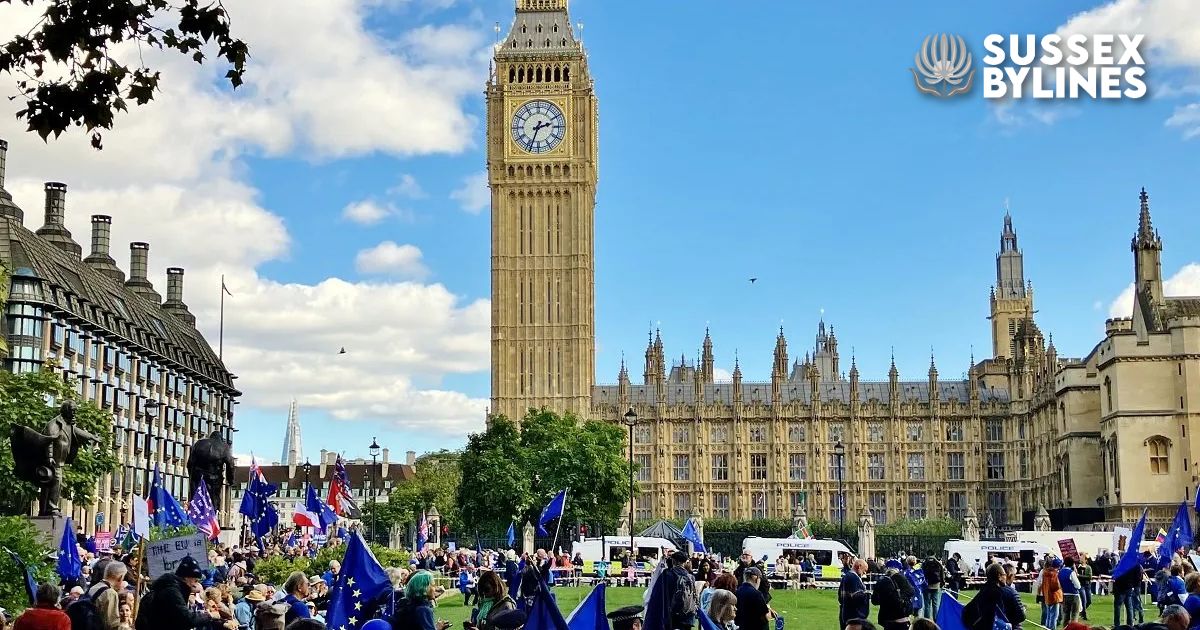When the Labour government took office in July 2024, Prime Minister Keir Starmer “pledged to reset the UK’s relationship with the EU and reduce barriers to trade”. Sounds good, but what does this reset actually consist of? Mainly, “an ambitious new UK-EU security pact”, that is, closer cooperation over people-smuggling gangs. Trade commitments amount to negotiating a veterinary agreement and not much else.
The government’s ‘red lines’ are stifling debate
The main problem is that Starmer’s government is hemmed in by a number of ‘red lines’, which render closer cooperation almost impossible. As Jonty Bloom argues in The New European: “Without negotiating on and around the issues of free movement, the customs union and the single market, the ‘reset’ is a pretty pathetic thing.” It amounts to warm words and not much more.
I have been particularly frustrated by the government’s opposition to a youth mobility scheme which, as Lewes Lib Dem MP James MacLeary explained, is widely supported, even by Leave voters. The government claims that such a scheme would amount to “reopening freedom of movement”, which MacLeary dismisses as “untrue and misguided”.
Because of the red lines, debate around the issues is constrained and stifled. Brexit is the elephant in the room: Rachel Reeves’ spring statement was striking (among other things) for not mentioning it.
So it was refreshing – and rare – to hear an open discussion of the merits of EU membership when MPs debated recently whether to (re)join the EU, following a successful public petition about this. Members of all political parties took part, apart from a noticeable absence of Reform UK MPs.
The huge economic costs of leaving the EU
In the three-hour debate, MPs set out the huge financial costs to the UK economy and specific hits to business in their own constituencies because of the “botched” Brexit deal. These included losses to farming, fishing, the steel industry, horticulture, hospitality, retail, universities and the arts across the country.
MPs mentioned the Office for Budget Responsibility (OBR) estimates of a 15% reduction in trade since leaving the EU and massive 4% reduction in the UK economy overall by 2035. Some also cited the even higher Goldman Sachs figure of up to 8% reduction in GDP.
Labour MP Tim Roca said: “Some 14,000 of 100,000 firms surveyed by the London School of Economics have quit trading with the EU altogether.” He and many other MPs mentioned the barriers, red tape and bureaucracy swamping businesses. Roca also pointed out: “We are now also in the midst of a trade war, having deliberately left one of the most powerful trade alliances that exists.” The anger among MPs about this dire situation was evident.
Rejoining the customs union and single market
In terms of positive ways forward, several Labour MPs mentioned rejoining the Pan-Euro-Mediterranean convention, which covers “rules of origin” and would help to ease trade barriers to some extent.
But Lib Dem, SNP and Plaid Cymru MPs wanted to go further. Italian-born Lib Dem Manuela Perteghella stressed the importance of rejoining the single market and negotiating a new trade deal that includes a customs union. She said: “This is not just about trade; it is about values, opportunities, who we are and the role we choose to play in the world.”
Lewes MP James MacCleary argued that entering a bespoke customs union would “remove mountains of red tape” and (citing Best for Britain figures) could help increase GDP by up to 2%. In an impressive speech, he said the government must “move beyond cherry-picking and timid gestures” and urged them to “ditch their nonsensical red lines”. A customs union would also help to protect the UK from “Trump’s irrational pro-tariff policies”.
The USA is no longer a reliable ally
Speaking days before Trump’s new tariffs have shaken the global economy, Lib Dem MPs were also at the forefront of warning about the actions of the US government and this was a striking thread of the debate.
MacCleary said that Trump’s “aggressive trade and defence stance” and “appeasement” of Putin “reminds us of how crucial our European ties are, not just economically but strategically”. Several other Lib Dem MPs argued strongly that the return of a Trump administration made forging closer ties with the EU a matter of urgency, for defence reasons as well as trade.
Brexit: a “disaster for the country” – but is anyone listening?
Lib Dem Paul Kohler summed up well the frustration and anger expressed by many others: “The Tories’ botched Brexit deal has been a disaster for our country… The Conservative government wrecked our relationship with the EU and the new Labour government refuse to take the necessary steps to repair it.”
However, a response by Labour minister Abena Oppong-Asare, which ended the debate, only served to confirm Kohler’s views. She reiterated that Labour “will not seek to rejoin the EU, nor will there be a return to freedom of movement, the customs union or the single market.”
Despite all the moving testimonies from MPs over the previous three hours, including back-bench Labour MPs, it was as if no one had said a word. And despite Trump’s tariffs causing stock markets to dive across Europe and Asia, No 10 has just confirmed “it’s still opposed to [a] customs union”.
No one in government seems to be listening and the red lines are as firmly drawn as ever.
For a full record of the Parliamentary debate see Hansard.
Related article by John Wilmslow
CLICK HERE TO DONATE TO OUR CROWDFUNDER
HELP US BECOME STRONGER SO THAT WE CAN CONTINUE TO DELIVER POWERFUL CITIZEN JOURNALISM!

